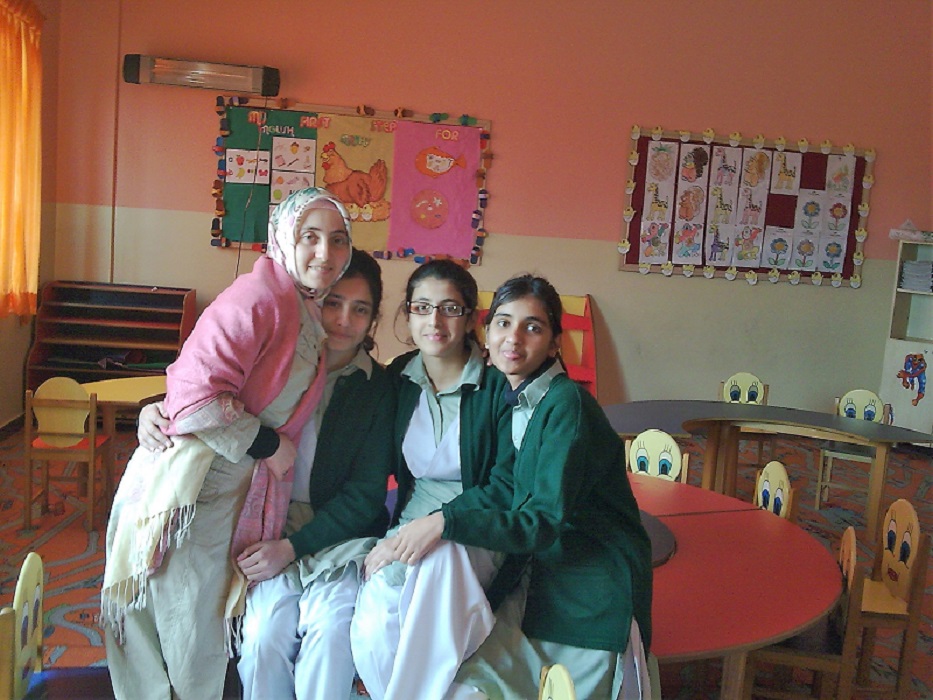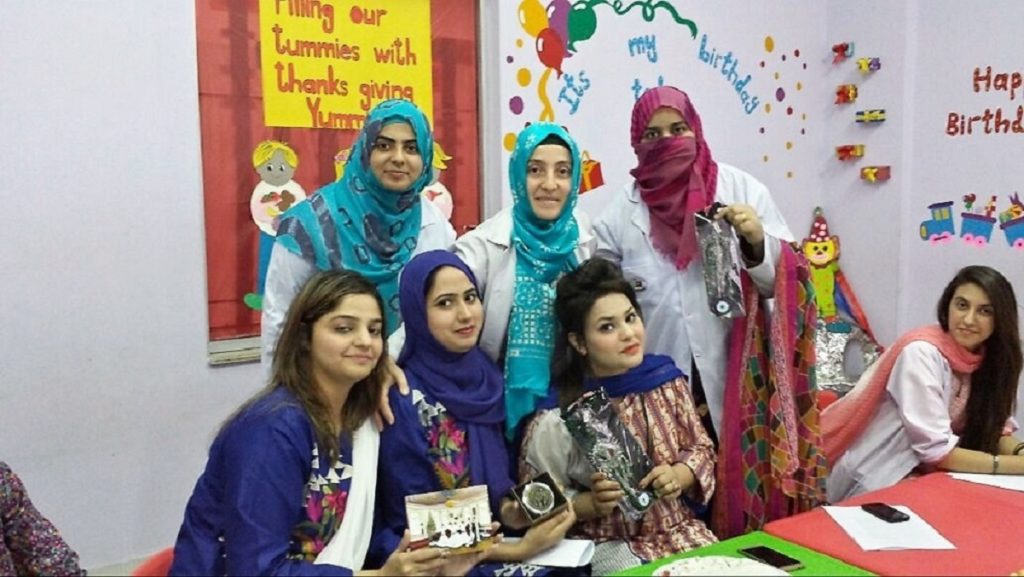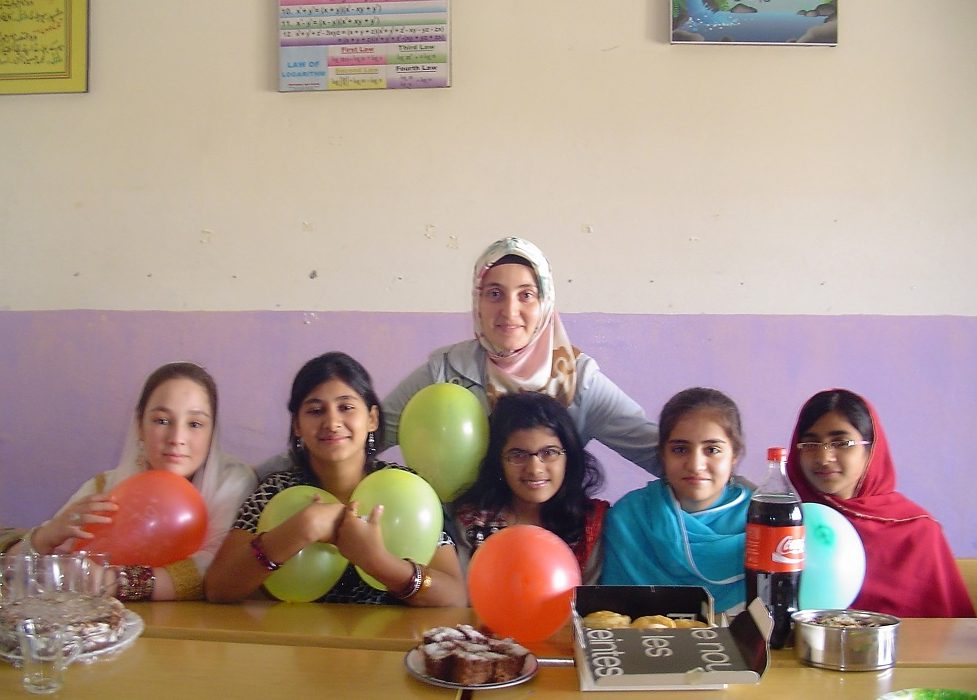English teacher Gönül Barış (2): I learned Urdu while arguing with rickshaw drivers

Bahauddin Zakariyya: Multan’s Patron Saint
April 1, 2022
What ensued in the business trip of the Karachi Chamber of Commerce to Turkey?
April 8, 2022In the second part of our interview, PakTurk Schools English teacher Gönül Barış narrates her university years in Lahore, her rapport with the boarding students in the hostel where she volunteered as a mentor, and her marriage process. Mrs. Gönül explains with a laugh how she learned English at school, but learned the local language Urdu by conversing with rickshaw drivers during her daily rides.
-How did you spend your time during your university years in Lahore? What were the students’ and teachers’ reactions to you?
We started the university in our second year in Pakistan. As six pals living in the same house, we all enrolled in the English literature degree program. Going everywhere together, we were like the ‘Dalton girls’😊. We were the university’s first foreign students. Everyone was eager to see us. They wished to sit next to us and become friends. Thanks to the teachers; they helped us a lot throughout those four years. They’d show us as examples in class and say, “Look, these guys have only just arrived, but they’ve made up for what they’ve missed.” A few teachers, in particular, supported us no different than the way our mothers did. PakTurk Schools’ large school building in Lahore had just been completed. We used to get permission from the university administration and introduce the PakTurk Schools through PowerPoint presentations in various departments to find students for our new school. One of the lecturers enrolled her child in our school.
They made us feel very welcome at the university. We were never subjected to unfavourable treatment. They probably treated us more favourably than other foreigners because we were Turkish. I never considered visiting another country while I was in Pakistan. It had never occurred to me to say, ‘Let me graduate from university and either return to my home country or migrate to another country.’ I had always hoped to stay in Pakistan and serve the people there.
Teaching had always been a dream. When I went to the PakTurk School, I used to tell the teacher sisters, “One day I will sit in this staffroom and drink tea with you!” That day came, and I finally graduated. I studied English in school. We learned Urdu by arguing and discussing with rickshaw drivers on our way to and from school.
-How did things go in the hostel where you volunteered as a mentor? What were your routine activities with the students?
In our third year, we moved to the hostel where female students from various cities who came to study at the PakTurk School stayed. We relocated to live with them. The hostel administration also assigned us an aunt to cook for us. Her husband had recently died. Every day, she was sick and depressed. She was always in tears. Most of the time, we’d say to her, “Okay aunt, you rest, and we’ll cook the food,” and walk into the kitchen. We attempted to prepare foods that the boarding students would enjoy. We’d ask them what they ate on a regular basis. “I eat channa in the morning!” One student said one day. We had never heard of channa before. We looked it up in the dictionary to see what it meant in English. It referred to a dish made from chickpeas. For breakfast, she wished to eat chickpeas. We learned that the locals did not eat breakfast the same way we did. It wouldn’t make sense to put olives and feta cheese in front of them. We learned something new about Pakistani culture that day. Breakfasts were meant to be a bit spicy.
WITH A BOOM, THE GAS CYLINDER SPEWED FLAMES!
The students could not speak English well, but they were also learning Turkish at school. We tried to communicate with them in Turkish, then. We helped them to improve their Turkish. We got along well with them. We even shared a house with one of them for years and shared a room for a while. They also helped us a lot. They were also quite helpful to us. We also asked them about our schoolwork occasionally. We actually became like sisters. We grew beyond the mentor-student barrier. They called us “Sister” and considered us as their real sisters. They would share everything with us and come to tell us about their day at school. We did not keep distant. We used to have tea time in the evenings. We endeavoured to ensure the boarding students to have a good time and stay happy. They were really happy that year.

When the PakTurk School in Lahore moved to its brand-new building, all its materials were placed on the ground floor of our hostel. We lived upstairs. The hostel had no natural gas connection. One day, the hostel management brought a large industrial gas cylinder to the hostel. It had been about 10 days since we arrived from Turkey. Whenever we returned from Turkey and from our parents’ side, we would always feel blue anyway, it would take us a bit longer to get used to things. We were 6 girls and we always supported one another. We were on the same bus and in the same school, the same hostel, and the same house; we had everything together. The management taught a few friends how that large gas cylinder was turned on and off. I did not know how to operate the cylinder. I had never been near that cylinder until that day. A friend called out, “Okay, I prepared the dinner. Turn off the cylinder!” Friends said “You go and turn off the cylinder.” “But I’ve never done it before, I don’t know anything about it,” I said. Still, they said “Go there and you will do it” and gave me instructions. It turns out I turned the gas cylinder further on when I was trying to turn it off. At that moment, the cylinder spewed flames with a boom. I was petrified. We all screamed. Meanwhile, the gas cylinder continued to burn. With every fireball spewing out came a boom and shake. Workers at a construction site across the street heard our cries. They came running. They got into those flames and ripped the cylinder out. Otherwise, the whole neighbourhood would probably explode. They threw the cylinder outside and put out the fire. Pakistani people are such self-sacrificing people.
The parents were just as devoted, as were the teachers we worked with and students we taught. Indeed, I learned friendship from Pakistanis, for sure. It was a unique feeling to feel their friendship during hard times. I experienced their friendship more after we were expelled from our schools.
BOARDING STUDENTS DID NOT WISH TO GO HOME ON WEEKENDS!
Yet the tests in the hostel were not over. At first, there was no natural gas connection. Later, the gas was connected, but the water supply stopped suddenly. Back then, the boarding students did not cause us any trouble. They used to go to the school for their bath and washroom needs. We used to visit the houses of married sisters for bath. Why didn’t the students and sisters complain about that? They knew, too, that the management was trying to fix the problem. Many repairmen came and every water fixture in the hostel was changed, but the location of the malfunction could not be found. Every now and then, a little water would flow and we would rush to fill the bottles and containers. The reason for the problem was discovered later. A brother had said, “Let’s also get the pipes in front of the gate checked!” A part of the water pipe extending to our hostel had been bent and broken under the asphalt. Whenever a large vehicle passed, the pipe would open a little with the tremor and water would pass through. The pipe was changed and the issue was resolved.
Soon it was summer vacation and we all went to Turkey. While we were gone, a thief broke in the hostel. They removed the taps and stole our DVD player with the air-conditioner remotes. After that, it was decided to move the hostel. When we arrived, we found the hostel to have moved to another building. When I say hostel, do not think it was a large building. It was a two- or three-storey villa.
-How was your rapport with the students in terms of spiritual guidance? How could you influence them?
People of Pakistan are generally religious. It is more difficult to explain religious sensitivities to people who already know about them. It is very common to eat food by hand, especially from the perspective of following the practice (sunnah) of our Holy Prophet (may Allah’s peace and blessings be upon him). A friend of ours was very sensitive about this. Drawing attention to cleanliness, she would warn the students “Eat with a spoon and a fork, not with your hands!” One day, a student said, “This is a sunnah, you are preventing us from following the practice of our Prophet!” Our friend told her about several other essential practices of our Holy Prophet that must be followed in life and that cleanliness was one of the most prominent practices of our Holy Prophet (may Allah’s peace and blessings be upon him). Things like this happened sometimes. Thankfully, the students listened to us well. They offered their daily Prayers regularly. For example, they would have no difficulty in getting up for the morning prayer. Whenever they were called, they would get up and come for the Prayer immediately. They loved the Prayer. These attitudes of the students also connected us to Pakistan. It affected us whenever they looked us in the eye while they told us something, listened with interest, learned what they were told and tried to practice their learning immediately. They would sometimes say, “We told the class today what you had told us yesterday”. It would make us happier. Their families were happy. Some families came to thank us. On some weekends, the students did not even wish to go home. We became very attached to the students, both emotionally and spiritually.

WE USED TO COUNT OLIVES AT BREAKFAST
After the hostel, we divided the students into two houses and stayed with them. That year, new mentors arrived from Turkey. We tried to guide them in school enrolment and language learning. Pakistani students also tried to help their newly arrived Turkish sisters, and supported them in their learning English and Urdu. They would accompany them to the market, shop and teach them where and what to buy. The students were exquisite back then. The following year, another house was opened. I stayed with Turkish friends. One of our former Pakistani students was with me. That girl had become one of us. Later, she went to Turkey and studied at a university. She was with me when my husband came to ask my hand for marriage. She lived that excitement with me. We had such a friendly connection. I never thought, ‘Let me go back to my country after my school is over’.
-How was your marriage? Can you talk a little bit about your spouse?
I graduated from university in 2010. In the same year, I met my husband, who was a teacher in Khairpur Mirs. We decided to get married. My husband is a computer teacher. He had worked in Mongolia for two years and came to Pakistan 3 years before our meeting to learn English. So, he had arrived in Pakistan before me. When we first met, it was 2-3 months before my graduation from the university. I informed my parents. Of course, they were very curious. They immediately asked who he was and what kind of a person he was. They went to Konya, where my husband’s family lived, in Turkey. My father did research by saying he would buy a house in that neighbourhood, and nothing negative hit his radar. My parents accepted when our brothers in Pakistan vouched for my husband. Our wedding took place in Turkey that summer vacation. We returned to Pakistan 10 days after our wedding. While preparing for the trip, I went shopping with my husband. Since we knew the Pakistani conditions, we would pack olives, cheese, etc. in our luggage. We filled our luggage with things not available in Pakistan. My husband said “These are so many; we can’t eat them all!” And I said, “It’s not all for us, but for our guests as well.”
There were no olives in Pakistan back then. When I was a student, I used to take it with me on our return from vacation. According to the number of people, we used to make a rule that “Everyone will eat 3 or 4 olives”. A friend loved olives, but I thought she ate 3 olives like everyone else. Years later, she called me and said, “Please forgive your personal rights on me. You were counting the olive seeds, but I was also swallowing the seeds whenever I ate more than allowed.” We shared a hearty laugh. “You should have told me back then!” I said. That was a period of shortage and olives were very important to us. We are here in abundance now, but back then it was different.
To be continued…
***





No Comment.